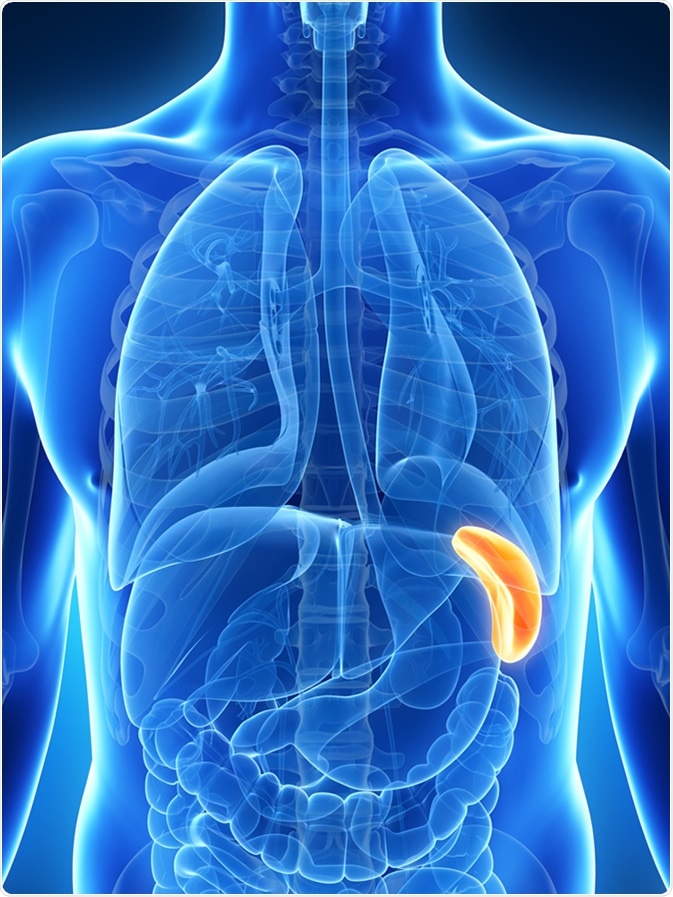The spleen is an organ situated behind the stomach, in the upper left part of the abdomen known as the left hypochondrium. It is located under the ribcage and therefore is not usually felt by the palpating finger. However, in abnormal conditions it may give rise to pain felt as an aching sensation deep behind the left ribcage. This area may also hurt when it is touched. This could signal splenic damage, splenic rupture, or splenomegaly. Severe pain arising from the spleen often signals the presence of splenic infarction.

3d rendered illustration of the male spleen - Image Credit: Sebastian Kaulitzki / Shutterstock
Spleen Damage or Rupture
Damage to the spleen is rare because of its protected position under the left side of the ribcage. In spite of this, it may occur with a very forceful blow to the abdominal area, as may happen during a fight, a motor accident, during a contact sport, or because of a rib fracture, with the broken end of the rib penetrating the spleen. This may cause immediate rupture of the spleen, or it may result in the formation of a hematoma. This may later resolve partially to produce a splenic cyst. In other cases, splenic rupture may not actually occur for some weeks following the trauma.
Some signs of splenic rupture include:
- Pain in the left hypochondrium, localized to behind the ribs, with tenderness to palpation.
- Cardiovascular instability such as dizziness and tachycardia because of intraperitoneal haemorrhage.
- Pain at the tip of the left shoulder on elevating the legs in the supine position: this is due to the presence of blood leaking from the spleen into the peritoneal cavity, pooling in and thereby irritating the left dome of the diaphragm when the patient adopts this position.
- Nausea, pallor, extreme nervousness, or fainting, may also characterize this condition.
Splenic rupture is always a medical emergency because it may be catastrophic in the degree of hemorrhage that occurs, and needs immediately evaluation and treatment.
Splenomegaly
Spleen enlargement, or splenomegaly, is another reason for splenic pain. This may occur due to a host of causes, whether traumatic, malignant, metabolic, or obstructive.
Causes of splenomegaly include:
- Myeloproliferative diseases such as chronic lymphocytic leukemia, chronic myelogenous leukemia, large granular cell leukemia, polycythemia vera
- Lymphoproliferative diseases such as lymphoma especially of the hairy cell variety
- Lipid storage disorders such as Gaucher’s or Niemann-Pick disease
- Connective tissue disorders such as systemic lupus erythematosus
- Inflammatory disorders such as amyloidosis and sarcoidosis
- Viral infections such as cytomegalovirus or infectious mononucleosis
- Acute bacterial infections such as bacterial endocarditis
- Chronic bacterial infections including malaria, syphilis, brucellosis and miliary tuberculosis
- Liver diseases such as cirrhosis, or thrombosis of the portal or splenic veins, causing obstruction to hepatic blood flow and backing it up to the spleen
- Hemolytic anemia including those due to a hemoglobinopathy, such as thalassemia, with increased destruction of blood cells in the spleen; or abnormal red cell fragility, such as hereditary spherocytosis
Many drugs induce spleen pain by their adverse effects. These include:
- Direct toxicity to spleen cells
- Pathological interference with the function of the immune system or liver
- Severe hemolysis
- Portal vein hypertension induced by hepatic toxicity of the drugs
The drug-induced adverse reactions are usually temporary and the spleen pain subsides with the spleen size once the drugs responsible are stopped.
Diagnosis of the cause of splenic pain is based upon the assessment of splenic size, hemodynamic parameters, history of injury or other medical conditions, and other symptoms. Palpation of the lower border of the spleen will reveal whether it is enlarged, because this occurs only after significant splenomegaly has occurred.
Splenic pain is evaluated using imaging with ultrasonic transducers or CT/MRI scanners. Treatment is directed at the underlying cause of the pain. Importantly, all contact with the organ should be avoided for a few weeks to avoid worsening the damage.
References
Further Reading
Last Updated: Feb 27, 2019